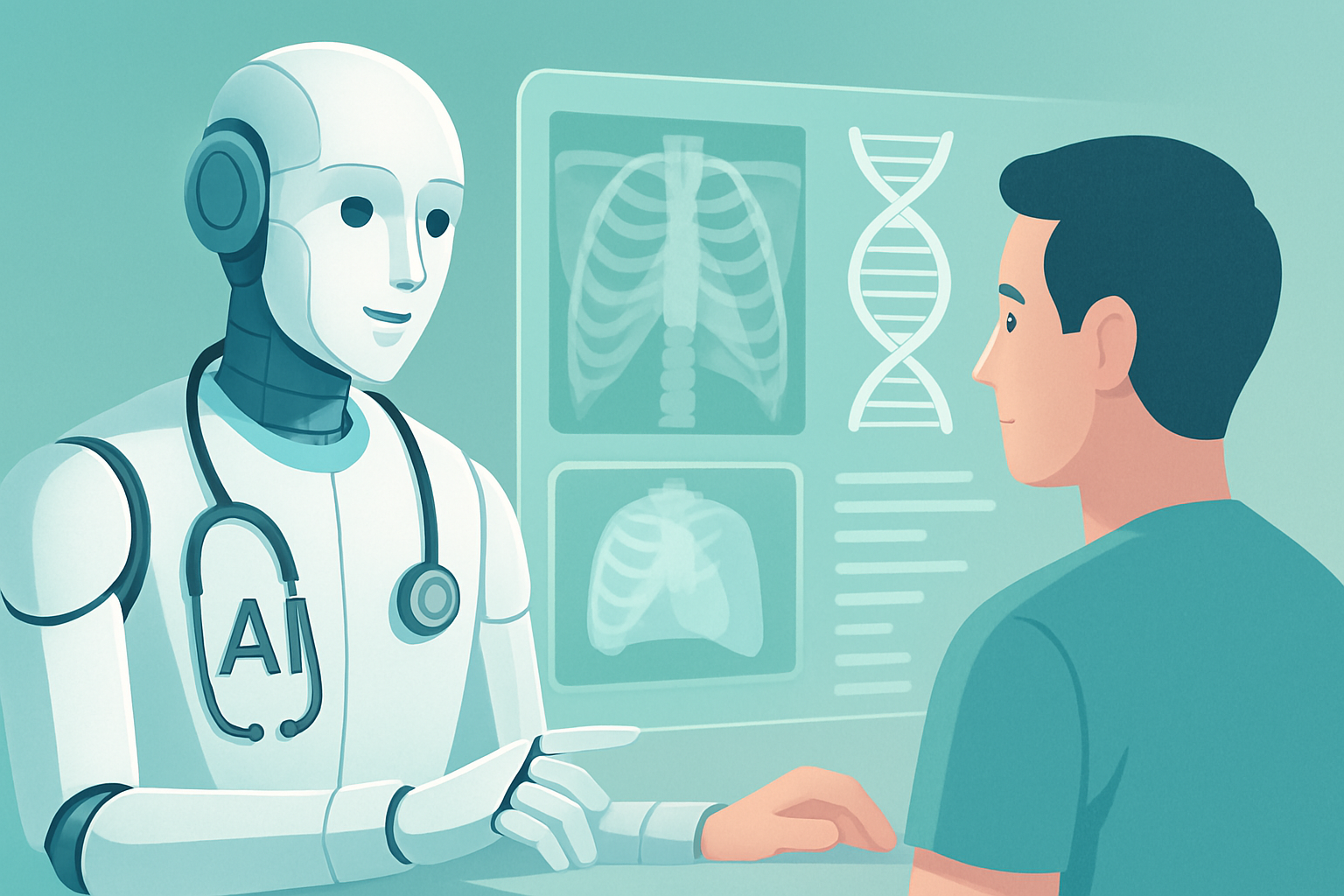Article 10: AI in Healthcare: Diagnosis, Drug Discovery, and Personalized Medicine in 2025
Meta Title: AI in Healthcare (2025): Diagnosis, Drug Discovery & Future Trends
Meta Description: Explore how AI is revolutionizing healthcare with advanced diagnostics, accelerated drug discovery, and personalized medicine. Discover top AI tools and future impacts for 2025.
Target Keywords: AI in healthcare, AI medical diagnosis, AI drug discovery, personalized medicine AI, AI healthcare tools
The AI Prescription: Transforming Healthcare with Diagnosis, Drug Discovery, and Personalized Medicine in 2025
Artificial Intelligence (AI) is rapidly becoming an indispensable tool in the healthcare industry, promising to revolutionize how diseases are diagnosed, treatments are discovered, and patient care is delivered. In 2025, AI is moving beyond experimental phases and into practical applications that enhance medical capabilities, improve patient outcomes, and streamline healthcare operations. From analyzing medical images with superhuman accuracy to accelerating the complex process of drug discovery and tailoring treatments to individual patients, AI is paving the way for a more efficient, effective, and personalized future for medicine.

AI-Powered Medical Diagnosis
One of the most impactful applications of AI in healthcare is in diagnostics.
- Medical Image Analysis: AI algorithms, particularly deep learning models, can analyze medical images such as X-rays, CT scans, MRIs, and retinal scans with remarkable accuracy. They can detect subtle patterns indicative of diseases like cancer, diabetic retinopathy, or neurological disorders, often earlier and sometimes more accurately than human radiologists.
- Impact: Early detection of diseases, reduced workload for radiologists, and improved diagnostic consistency.
- Pathology: AI can assist pathologists in analyzing tissue samples, identifying cancerous cells, and grading tumors, leading to faster and more precise diagnoses.
- Predictive Diagnostics: By analyzing patient data (EHRs, genetic information, lifestyle factors), AI can predict the likelihood of certain diseases developing, allowing for proactive interventions and preventative care.
Accelerating Drug Discovery and Development
The traditional drug discovery process is incredibly long, expensive, and often fraught with failure. AI is significantly speeding up this pipeline:
- Identifying Drug Targets: AI can analyze vast biological datasets to identify novel molecular targets for new drugs.
- Designing Drug Candidates: AI models can predict how different molecules will interact and design new drug candidates with desired properties, reducing the trial-and-error in traditional chemistry.
- Predicting Drug Efficacy and Toxicity: AI can simulate how potential drugs will behave in the human body, predicting their effectiveness and potential side effects before costly clinical trials.
- Optimizing Clinical Trials: AI can help design more efficient clinical trials by identifying suitable patient cohorts, optimizing dosages, and monitoring trial progress.
- Impact: Reduced time and cost for bringing new drugs to market, and increased success rates in drug development.
Personalized Medicine and Treatment Plans
AI is a key enabler of personalized medicine, tailoring medical treatment to the individual characteristics of each patient.
- Treatment Recommendation: By analyzing a patient’s genetic makeup, medical history, lifestyle, and real-time health data, AI can help clinicians choose the most effective treatment plan with the fewest side effects.
- Precision Oncology: In cancer treatment, AI can analyze tumor genomics to recommend targeted therapies that are most likely to be effective for a specific patient’s cancer type.
- Chronic Disease Management: AI-powered tools can help patients manage chronic conditions like diabetes or heart disease by providing personalized advice, monitoring vital signs, and alerting healthcare providers to potential issues.
Other Emerging AI Applications in Healthcare
- AI-Powered Robotic Surgery: AI can enhance the precision and capabilities of surgical robots, leading to minimally invasive procedures and faster recovery times.
- Virtual Health Assistants & Symptom Checkers: AI chatbots can provide initial medical advice, help patients understand their symptoms, and guide them to appropriate care.
- Mental Health Support: AI tools are being developed to provide accessible mental health support, including chatbots for therapy and tools for monitoring mental well-being.
- Healthcare Administration & Operations: AI can automate administrative tasks, optimize hospital workflows, manage patient scheduling, and reduce medical errors.
Benefits of AI in Healthcare
- Improved Diagnostic Accuracy & Speed: Leading to earlier and more effective treatments.
- Faster Drug Discovery: Bringing life-saving medications to patients more quickly.
- Personalized & More Effective Treatments: Tailoring care to individual patient needs.
- Increased Efficiency & Reduced Costs: Streamlining workflows and automating tasks.
- Enhanced Patient Engagement & Access to Care: Providing new avenues for support and information.
Ethical and Implementation Challenges
Despite the immense potential, the adoption of AI in healthcare faces challenges:
- Data Privacy and Security: Protecting sensitive patient data is paramount.
- Algorithmic Bias: Ensuring AI tools do not perpetuate existing health disparities due to biased training data.
- Regulatory Hurdles: Navigating the complex regulatory landscape for medical AI tools.
- Integration with Existing Systems: Ensuring interoperability between AI solutions and existing healthcare IT infrastructure.
- Trust and Acceptance: Building trust among clinicians and patients in AI-driven medical decisions.
- Explainability: The “black box” nature of some AI models can be a concern in critical medical decisions.
The Future Outlook
AI is set to become an even more integral part of healthcare. We can anticipate AI systems that work seamlessly alongside human clinicians, augmenting their skills and freeing them to focus on the human aspects of care. From preventative health to complex surgeries, AI will continue to drive innovation, leading to a future where healthcare is more predictive, personalized, participatory, and precise.
Leave a Reply